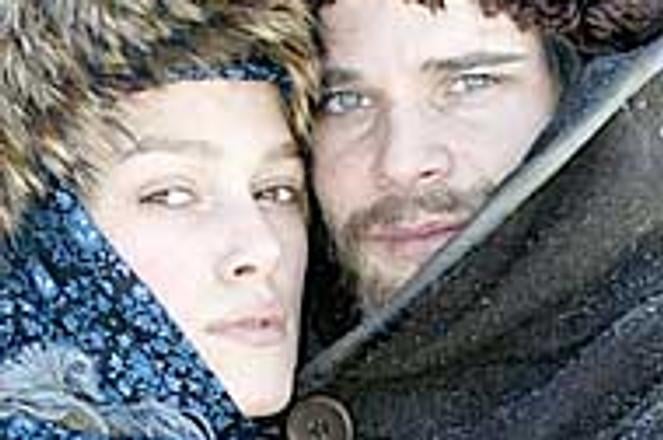THE TRAGIC lovers, Keira Knightley and Hans Matheson.photo: Courtesy of Granada
"We came here because we thought this would be the best place to get lots of snow. Although today, there's no snow in Slovakia but it's snowing in London."
RUSSIAN writer Boris Pasternak began work on Doctor Zhivago in 1945, claiming that the book would be "my first real work". A decade later he sent a hand-written version to Russian publishers. They refused to print it. Pasternak then turned to Italian publishers Feltrinelli. The novel was finally published in 1957 and a year later Pasternak received the Nobel Prize for Literature. He accepted the prize but was later forced by the Russian authorities to return it.
Banned in his home country, Pasternak's Zhivago was a huge success abroad. British director David Lean brought the story of unfulfilled passion between two lovers during the political disturbances in Russia to the cinema screen in 1965. Because of the Russian ban, the movie, starring Omar Sharif, had to be filmed in Spain. In 1966 it won five Oscars.
The classic book is about to be revived on the small screen thanks to a multinational production of a new adaptation by British screenwriter Andrew Davies. Directed by Italian Giacomo Campiotti, the film is being led by the British production team Granada and will be out by the end of this year. The two-part television drama promises to be closer to Pasternak's original text than Lean's 1965 movie adaptation, and it is being filmed partly in Slovakia and the Czech Republic.
Set against the tumultuous background of World War I and the Russian Revolution in 1917, Doctor Zhivago is the story of an anguished poet and physician Dr. Yury Zhivago, torn between his love for his wife Tonya and his passion for Lara, set against a backdrop of social upheaval which changes his world forever.
"We came to Slovakia specifically for winter, however it was ironic because there's no snow. We had to put down fake snow and do computer graphic snow. But there are some wonderful locations here. Fantastic landscapes, extraordinary villages," Granada producer Hugh Warren told The Slovak Spectator on March 15.
British filmmakers were shooting the horrific scenes of the Russian revolution - so gruesomely depicted in Pasternak's book - for almost two weeks in Slovakia. They built sets on natural reservations in the High Tatras mountain range, Žehra village near the huge ruins of the Spiš castle, and the preserved Slovak village of Vlkolínec, which is a Unesco listed site.
A RUSSIAN winter in Slovakia (Sam Neill at right).photo: Courtesy of Granada
"Andrew David's adaptation is much more accurate and more truthful to the book than Lean's screenplay," says Warren. "We can be much more direct about the Komarovsky-Lara relationship for example, which I think is rather confusing in Lean's movie, the viewer cannot really understand Komarovsky's character there. The main characters are also much younger, as Lara in the book is a schoolgirl."
Sixteen-year-old Keira Knightley, from England, and 26-year old Hans Matheson, from Scotland, play the tragic lovers Lara and Yury Zhivago, torn apart by Victor Komarovsky, played by the only Hollywood star in the film, Sam Neill (Jurassic Park, The Horse Whisperer, The Piano). Warren says Neill loves his part.
Even though the drama features many international actors, there are no Russians apart from a Russian consultant living in Prague. The production team also hired around 150 local Slovak people as extras, paying them Sk500 ($10) per day.
"We had problems finding the right people as the director is very visual and he wanted people with interesting faces," says Peter Samek from the Czech casting company. "But he's satisfied. The people we found are great in front of the camera. When we filmed the scene of Zhivago's father's burial in front of a church in Žehra village, they were marvellous as they played the sobbers."
The reason the film is directed by an Italian is not because it has Italian co-producers. According to Warren, the production team looked at many British directors but thought an Italian would give the film a more European interpretation.
"In Italy many people know the book, it's a set text. But in Britain, people know only the film, they don't know it's a book. So it's more interesting for us to have a director who knows the book and is passionate about it, but who has never seen the film. He did not come with all that baggage," says Warren.
"Many books get adapted many times, but people feel Zhivago is special. Because it's such an iconic film people were very afraid, I think, of adapting it. So it hasn't been adapted for a very long time. But in fact, when you read the book and look at the film, the film took a very particular take on the book and it's very much of its period, the 1960s," he adds.

